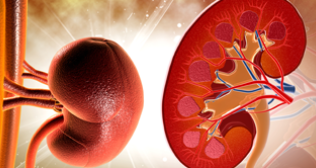Kidney Disease - No Kidding
Kidney Disease - No Kidding Mar 12, 2014

There is an increasing prevalence of kidney disease all around the world and also in our country. We have two kidneys, each about the size of our fist. Most people know that a major function of the kidneys is to remove waste products and excess fluid from the body. However, kidneys do much more than that.
WHAT DO KIDNEYS DO?
Kidneys are powerful chemical factories that perform the following functions:
- Remove waste products from the body
- Remove drugs/chemicals
- Balance the body’s fluids
- Release hormones that regulate blood pressure
- Produce an active form of vitamin D that promotes strong and healthy bones
- Control the production of red blood cells
WHAT IS CHRONIC KIDNEY DISEASE (CKD)?
Chronic kidney disease includes conditions that damage your kidneys and decrease their ability to keep you healthy by doing the jobs listed. If kidney disease gets worse, wastes can build to high levels in your blood and make you feel sick. You may develop complications like high blood pressure, anaemia (low blood count), weak bones, poor nutritional health and nerve damage. Also, kidney disease increases your risk of having heart and blood vessel disease. Early detection and treatment can often keep chronic kidney disease from getting worse. As it progresses,
chronic kidney disease may cause kidney failure, which requires dialysis or a kidney transplant to maintain life.
- One in 10 Indians has chronic kidney disease and another 20 million more are at an increased risk.
- Early detection can help prevent the progression of kidney disease to kidney failure.
- Heart disease is the major cause of death for all people with CKD.
- Glomerular Filtration Rate (GFR) is the best estimate of kidney function.
- Hypertension causes CKD and CKD causes hypertension.
- High risk groups include those with diabetes, hypertension and family history of kidney disease.
- Three simple tests can detect CKD: blood pressure, urine and serum creatinine.
According to recent research published in the American Journal of Kidney Diseases, many people with kidney disease are still in the dark. Nearly half of the people with an advanced form of kidney disease do not know they have weak or failing kidneys. When it comes to diagnosing and determining the best diagnostic test measuring glomerular filtration rate or GFR is the most accurate way to diagnose kidney disease. GFR is also the best tool to gauge a patient's stage of disease, enabling doctors to plot out the most appropriate course of treatment. In other words, knowing your GFR can save your life. Everyone who is at a risk of developing kidney disease must get their GFR checked on a regular basis.
WHO ARE THE PEOPLE AT A HIGHER RISK OF KIDNEY DISEASE?
You may have an increased risk for kidney disease if you:
- Have diabetes
- Have high blood pressure
- Have a family history of chronic kidney disease
- Are of an advancing age
WHAT ARE THE WARNING SIGNS OF KIDNEY DISEASE?
1. High blood pressure
2. Protein and/or blood in the urine
3. Higher level of creatinine
4. GFR of less than 90**
5. More frequent urination, particularly at night and difficult or painful urination
6. Puffiness around eyes, swelling of hands and feet
IS KIDNEY DISEASE PREVENTABLE?
In its early stages, kidney disease can be treated very effectively. People with CKD often take medicines to lower blood pressure, control blood glucose and lower blood cholesterol. Two types of blood pressure medicines - ACE inhibitors and ARBs - may slow CKD and delay kidney failure, even in people who don’t have high blood pressure. Many people need to take two or more medicines for their blood pressure. They also may need to take a diuretic (water pill). The goal is to keep your blood pressure under control.
WHAT CAN WE DO TO PREVENT KIDNEY DISEASE?
The key to preventing kidney disease is awareness of the common risk factors causing this condition and to ensure blood pressure and blood sugar control. We should all get into the habit of getting an annual health check-up just as we send our car for servicing at a garage. After all prevention is better and easier than cure.

 There is an increasing prevalence of kidney disease all around the world and also in our country. We have two kidneys, each about the size of our fist. Most people know that a major function of the kidneys is to remove waste products and excess fluid from the body. However, kidneys do much more than that.
WHAT DO KIDNEYS DO?
Kidneys are powerful chemical factories that perform the following functions:
There is an increasing prevalence of kidney disease all around the world and also in our country. We have two kidneys, each about the size of our fist. Most people know that a major function of the kidneys is to remove waste products and excess fluid from the body. However, kidneys do much more than that.
WHAT DO KIDNEYS DO?
Kidneys are powerful chemical factories that perform the following functions:



















